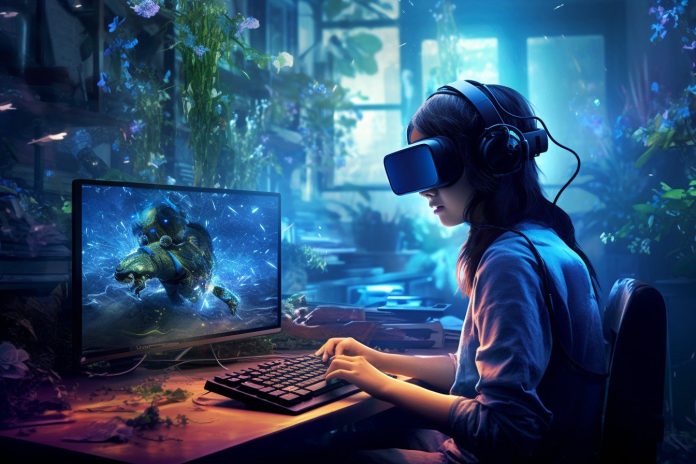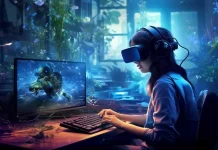Artificial Intelligence (AI) has become a transformative force in the gaming industry, elevating both gameplay mechanics and narrative experiences. From creating lifelike characters to enhancing the complexity of game worlds, AI is reshaping how players interact with and enjoy video games. In this article, we will explore how AI enhances gameplay and storytelling, its current applications, and the future it promises for the gaming industry.
The Role of AI in Gameplay
1. Dynamic NPC Behavior
Non-Playable Characters (NPCs) have traditionally followed predetermined paths and behaviors, often leading to predictable interactions. With the implementation of AI, NPCs can exhibit more complex behaviors, making them feel more lifelike and responsive. AI-driven NPCs can adapt to player actions, create unique responses, and even learn from past interactions, leading to more immersive gameplay experiences.
2. Procedural Generation
AI is also instrumental in procedural generation, a technique that allows developers to create vast, varied game worlds without the need for extensive manual design. Games like No Man’s Sky use procedural algorithms to generate planets, ecosystems, and quests, ensuring that each player has a unique experience. This not only enhances replayability but also allows for expansive environments that feel both rich and diverse.
3. Enhanced Difficulty Levels
AI can tailor difficulty levels to individual players, creating a personalized gaming experience. By analyzing player behavior and performance, AI systems can adjust challenges in real-time, ensuring that the game remains engaging without becoming frustrating. This dynamic difficulty adjustment keeps players invested and allows them to develop their skills organically.
The Impact of AI on Storytelling
1. Branching Narratives
AI can facilitate more complex storytelling by enabling branching narratives that adapt to player choices. In games like Detroit: Become Human, players’ decisions shape the storyline and character development, leading to multiple endings. This level of interactivity creates a more engaging narrative, as players feel their choices have real consequences on the game world.
2. Emotionally Intelligent Characters
With advancements in natural language processing and machine learning, AI is making it possible for characters to respond to players’ emotional cues. Games are beginning to incorporate emotionally intelligent NPCs that can recognize player emotions through dialogue choices or in-game actions. This allows for more meaningful interactions and deeper connections between players and characters.
3. Story Generation
AI is also paving the way for procedural storytelling, where narratives can evolve based on player actions and choices. While still in its early stages, this technology enables games to generate unique story arcs and character development on the fly. As AI continues to advance, we may see stories that adapt and evolve in real-time, offering truly personalized gaming experiences.
Current Examples of AI in Gaming
1. The Last of Us Part II
This game utilizes AI to create realistic NPC behavior and complex emotional storytelling. The enemies adapt to player strategies, using tactics that reflect the player’s style, while the narrative responds to players’ choices, deepening the overall experience.
2. Shadow of the Tomb Raider
In this game, AI enhances both enemy tactics and environmental interactions. Enemies coordinate with one another, creating challenging encounters, while AI-driven elements in the environment respond to player actions, adding layers to gameplay and exploration.
3. F.E.A.R.
The AI in this horror game is known for its advanced enemy behavior, allowing foes to flank players, use cover, and communicate in realistic ways. This level of intelligence creates a genuinely suspenseful and engaging atmosphere.
The Future of AI in Gaming
1. More Realistic Worlds
As AI technology advances, we can expect even more lifelike environments and characters. AI will allow for the creation of dynamic ecosystems where flora and fauna respond to player actions, enhancing immersion in virtual worlds.
2. Personalization and Player Engagement
Future games will likely employ AI to offer hyper-personalized experiences, tailoring gameplay, narratives, and challenges to individual player preferences. This could lead to games that evolve uniquely for each player, creating a deeper connection to the content.
3. Ethical Considerations
As AI becomes more integrated into gaming, ethical considerations will arise. Developers will need to address issues related to AI behavior, data privacy, and the implications of creating highly realistic virtual characters. Navigating these challenges will be crucial in shaping the future landscape of gaming.
FAQs
1. How is AI used in video games?
AI is used in video games to enhance NPC behavior, create procedural content, tailor difficulty levels, and develop branching narratives, leading to more immersive and personalized experiences.
2. Can AI create entire games on its own?
While AI can assist in various aspects of game development, such as procedural generation and storytelling, human creativity and design are still essential for creating a cohesive gaming experience.
3. What are some popular games that use AI?
Notable games that utilize AI include The Last of Us Part II, Detroit: Become Human, and No Man’s Sky, showcasing the technology’s impact on gameplay and storytelling.
4. Will AI make games too easy or too difficult?
AI can adapt difficulty levels based on player performance, creating a balanced challenge that keeps the game engaging without becoming frustrating.
5. How might AI change the future of gaming?
AI has the potential to create more immersive worlds, personalize gaming experiences, and enable more complex storytelling, transforming how players interact with games.
In conclusion, AI is a powerful tool reshaping the gaming landscape, enhancing both gameplay and storytelling in ways previously thought impossible. As technology continues to evolve, we can expect even more innovative applications of AI in gaming, leading to experiences that are richer, more engaging, and deeply personalized. The future of gaming looks promising, with AI playing a central role in its ongoing evolution.





